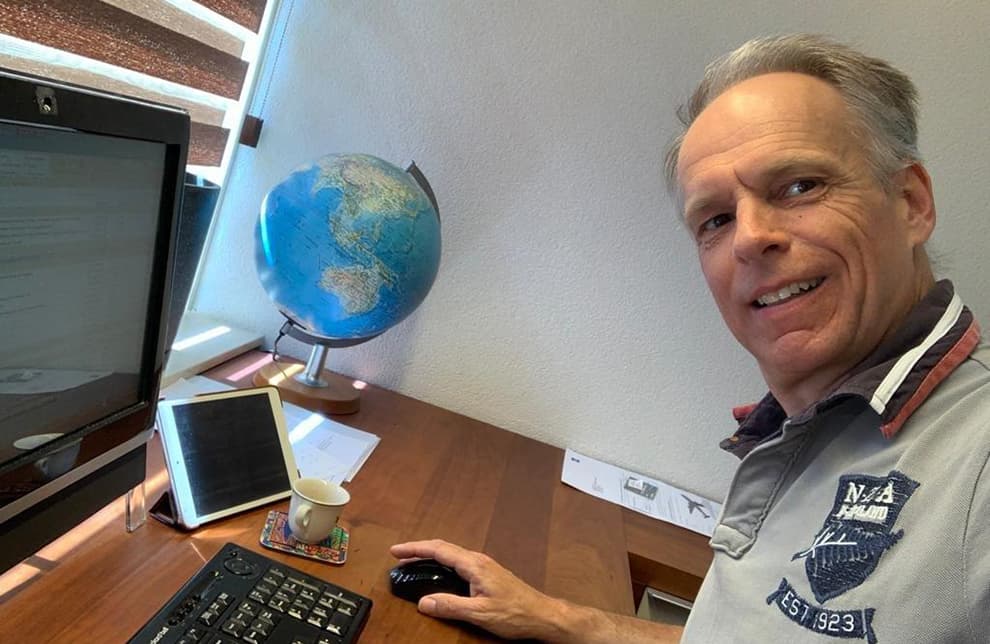When you think of Schiphol, you think Amsterdam. But Royal Schiphol Group expands way beyond the borders of this famous Dutch city. In fact, even beyond the country’s borders. And, on the road to recovery from the coronavirus, global cooperation is more important than ever. We spoke to Marcel Lekkerkerk, Route & Business Development, to discover how Schiphol is working on total industry recovery.

Gepubliceerd op: 18 juni 2020
In addition to the airport in Amsterdam, Schiphol manages three other airports in the Netherlands: Rotterdam/The Hague, Eindhoven, and the newest addition, Lelystad Airport. ‘We built the Lelystad terminal building from scratch,’ Marcel says. ‘And we used all our knowledge about sustainable building, traffic flows and passenger comfort. In that way, lessons we’ve learned from our other airports helped us design an optimal experience in the new one.’
And that kind of knowledge sharing is crucial in the age of coronavirus. That’s why Marcel and his team are staying closely connected to airports around the world, sharing experiences and best practices, and learning what it will take to get the global travel industry back on its feet. The Schiphol International cooperation includes Brisbane, Hobart, JFK Terminal 4, Aruba, St. Maarten and Groupe ADP airports. ‘Even though each country is in its own stage of controlling the virus we, as an industry, are all facing the same issues, concerns and needs. So we need to stay in close contact and help each other.’
Addressing common questions together
Before the virus, the airports involved in Schiphol International discussed the common issues airports face, and the best ways to serve airline and passenger needs. Now, all eyes are focused on the road to recovery. ‘Everywhere in the world, airlines are asking the same question: “how can we make travel as safe as possible, and restore passenger confidence so that we can get our industry moving again?” Every few weeks, Schiphol International partners meet to find the best answers to those questions.’
Of course, the airports are ‘meeting’ online, across several time zones. But even here, they’ve found that cooperation makes things easier. ‘The airports take turns working the “graveyard shift”,’ Marcel explains, ‘and participate in the meeting at some ungodly hour of the day or night. That way, everyone gets a chance to have the meeting at a decent time, and everyone shares the struggle of an occasional annoyance,’ Marcel laughs.
Marcel says that the airports are learning to navigate new waters together, too. ‘Regulations in place to fight the spread of the virus can differ per country,’ he says. ‘That makes it complicated to plan travel routes and adhere to all the new standards.’
At the same time, Marcel explains, there’s a big difference between passengers being able to fly, and being willing to fly. And that difference is trust. ‘Schiphol Group airports are doing everything they can to ensure the highest possible levels of safety,’ Marcel says. ‘Every airport shares responsibility for restoring traveller confidence and anticipating what the scale-up will look like. So when the time is right, we’ll all be ready to accommodate the growth, however gradual it is.’
The first signs of relief
Now that 16 European countries have cautiously opened their borders for European traffic, Marcel and his team are watching carefully. ‘There is a lot we can learn about how travellers will choose to move now that travel restrictions are being lifted. We’re studying how many passengers are flying, what types of passengers are the first to initiate movements, and what airlines need to do to prepare,’ he says. ‘Based on this information – which we also share with our Schiphol International partners – we can all prepare for the industry’s recovery.’
But it’s not just about preparation. It’s also about celebration. In the past month, passenger numbers at Schiphol have risen from 2% to 7% of last year’s level. Still low numbers, but certainly growth. And, as Schiphol began to welcome back the airlines that had been away these past few months, Marcel and his team saw it as a reason to celebrate. ‘We recently started a new initiative: from now on, every time an airline arrives at Schiphol for the first time since the outbreak, we’ll be there to welcome them with banners, cheers, and our famous stroopwafels. And we won’t forget the airlines that have already started up again, or those who continued flying throughout the crisis. Every incoming flight is another reason to celebrate – even if it is with facemasks on and at 1.5-metre distance.’
Work with a human touch
Marcel says those moments of celebration feel just as good for the RBD team as they do for the airlines. ‘Like most people, we’ve been working at home for the past three months,’ he says. ‘And although it’s a perfectly fine way to get work done, I’ve been missing the human contact that my job usually entails. Those face-to-face meetings and contact moments that make my job such a pleasure. So, these “Welcome Back” moments with the airlines are especially nice. They remind me that someday soon, I’ll be back in personal contact with the airlines I work with.’
And that’s one aspect of the job that Marcel hopes doesn’t change after coronavirus is behind us. ‘The pandemic has taught us that we can get a lot done with video calls and remote working, so I suspect some of our processes will be more efficient and electronic in the coming years. But nothing can replace those in-person contact moments, when we can really connect airlines and airports. I can’t wait to restore those moments, since they’re what make my job so worthwhile.’